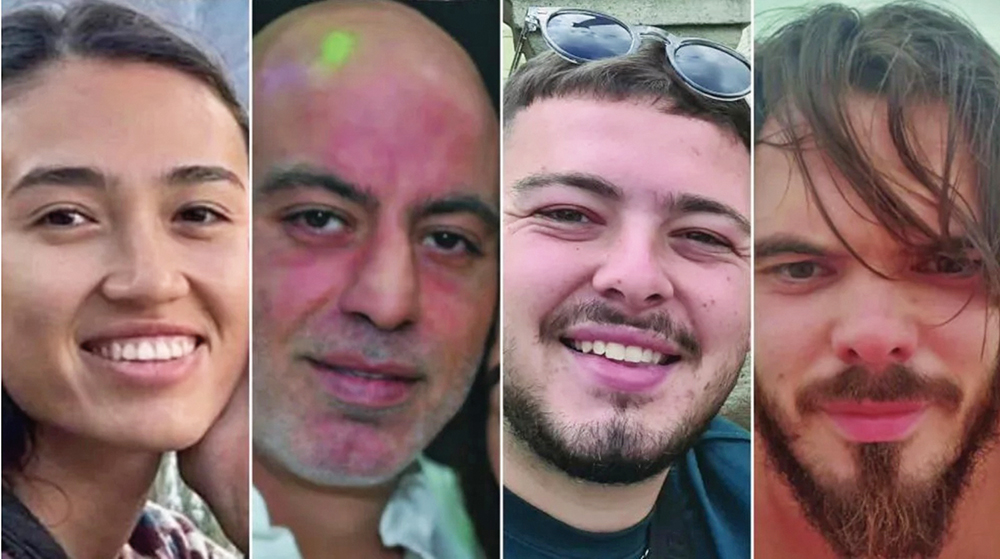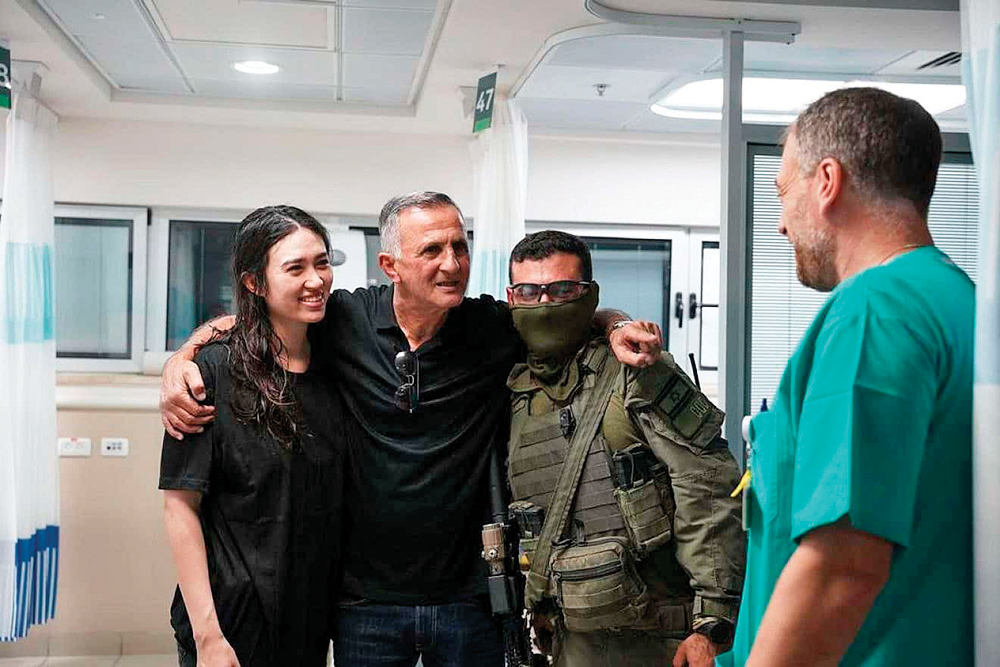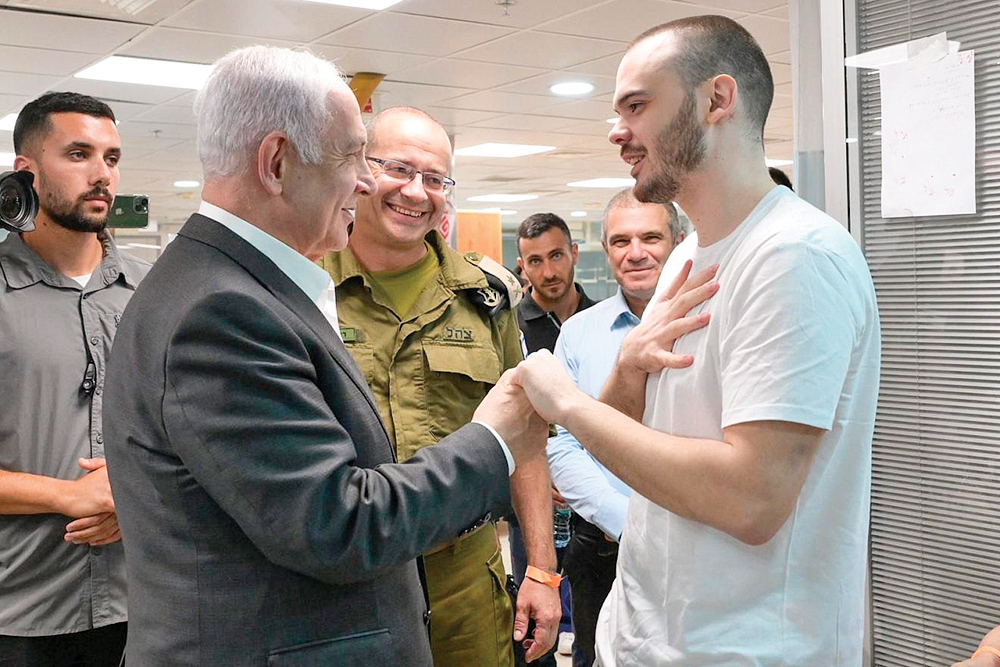“They have been physically and mentally abused for a long time,” a doctor who treated them said.

(Credit: Hostages and Missing Families Forum)
The four hostages rescued on Saturday, June 8 after eight months in Gaza captivity are in a “state of severe malnutrition,” according to a doctor who treated them upon their return to Israel.
“They have been physically and mentally abused for a long time. They are all in a state of severe malnutrition, although it does not appear that way to them,” Dr. Itay Pessach, director of the Edmond and Lily Safra Children’s Hospital at Sheba Medical Center in Ramat Gan, told Channel 12 on Monday.
During “Operation Arnon,” Israeli forces rescued the four hostages from two separate locations in Nuseirat Camp in the central Gaza Strip—Noa Argamani, 26, from one apartment, and Almog Meir Jan, 21; Andrey Kozlov, 27; and Shlomi Ziv, 40, from another.
All four were all abducted by Hamas terrorists from the Supernova music festival near Kibbutz Re’im during the Oct. 7 massacre.

They were being held in apartments in a densely populated residential area of Gaza; Pessach explained that the medical condition of others, who were held in Hamas’s vast subterranean tunnel network, was much worse upon their liberation.
“I think there is a significant difference, but one cannot compare the suffering of one person to another. They all suffered from all types of abuse—physical abuse and mental abuse and for a long time,” the doctor explained.
Some 250 people were kidnapped to Gaza during the Oct. 7 onslaught, with 116 remaining there, with at least 40 considered no longer alive by Israeli authorities. Two mentally ill Israelis crossed into Gaza on their own years ago, and are also being held by the terrorists, as are the bodies of two IDF soldiers killed in the 2014 Gaza war (“Operation Protective Edge), yielding a total of 120 Israelis held in the Strip.
One hundred thirty-four hostages have been returned to Israel.
Pessach said that from the first wave of released captives in November, Israeli medical teams have adhered to a protocol they developed along with the Health Ministry, including investigating the nutritional and physical condition of the returnees, with lab tests, imaging tests and tests for the function of the heart and other organs. They also check for various injuries.

(Photo by Maayan Toaf/GPO)
Furthermore, the returnees undergo a psychological and psychiatric evaluation and receive a psychological escort. A psychosocial team greets them first thing upon their arrival, he said.
Almog Meir Jan returned to the news that his father, Yossi, had died hours before his rescue after 246 days of captivity. His mother, Orit, who had a birthday on Sunday, said that “it is very, very difficult the way it happened and it saddens me that he cannot say goodbye to his father. Today we are going to bury him and we will give him the last honor he deserves.”
Channel 12 on Sunday night aired details about the experience of the captives from family members who were with them at Sheba Medical Center from their arrival on Saturday.
According to the families, Meir Jan, Ziv and Kozlov formed a strong bond being held together for so many months in the same apartment.
“During the entire period of captivity I was together with Andrey and Shlomi in the same room,” Meir Jan said, as told by his relatives to the Israeli news outlet. “Sometimes the terrorists abused us but we remained strong and supported each other very much. We are very united.”
Meir Jan also said that sometimes the three cooked for themselves and even managed to exercise.
Meir Jan was also somewhat informed about events in Israel during his captivity.
“We saw the rally in ‘Hostage Square’ [in Tel Aviv] the day before Holocaust Remembrance Day, and there I saw my picture hanging. The terrorists informed us about the events, we knew about the demonstrations and rallies and also about the controversy surrounding the conscription law. In captivity I kept a diary, a kind of tablet. A year in which I counted the days, that’s how I knew that mom was celebrating her birthday today.”
Meir Jan discussed the harrowing moments of the dramatic rescue, saying that the night before he got a haircut and shaved.
“When the IDF forces came to rescue us, both we and the terrorists were sleeping. We heard the forces and didn’t believe it at first. During the rescue they kept shooting at us from all directions, and when we got out we got stuck with the vehicle twice and it was very stressful.”
Ch. Insp. Arnon Zamora, a member of the Israel Border Police’s “Yamam” National Counter-Terrorism Unit, was mortally wounded during the mission.
Argamani was reunited with her father, Yaakov, and later with her terminally ill mother, Liora.
“Unfortunately, her mother is in very poor condition,” Yaakov told Ynet. “She barely looked at Noa. They met after eight months, but it was very difficult.”
He said he believed that his wife understood. “There was a kind of response. Liora understood but simply couldn’t express her emotions or say what she had longed to tell Noa when she finally met her.”
“It’s a miracle,” Liat Ariel, cousin of Shlomi Ziv, told JNS on Monday.
“We are still digesting the news. We don’t really quite understand what happened to us. Suddenly, Shlomi is back,” Ariel said.
“We are so happy and a bit nervous. We want to make sure that he is fine. He looks alright physically but mentally we don’t know yet. We have to wait a few more days,” she added.
Ariel said her dream had been for Ziv to return to spend Shavuot with the family in Nahariya.
“Every year, Shlomi’s mother, Rosita, prepares a Georgian feast for everyone. On Saturday, before we received the news that he had been rescued, we were having a conversation on whether or not we should get together for the first time in months,” Ariel recalled.
“Five minutes later, we saw Shlomi’s face on Telegram. That’s how we realized he was free,” she continued. “We’ve postponed our Shavuot celebrations to next week when Shlomi is back home. Meanwhile, he will stay in the hospital and celebrate the holiday there with his parents, his sister and his wife, Miren.
“Shlomi cannot wait to be home. Yesterday, at the hospital, he said that he felt cooped up. He wants to be outside, breathe fresh air and just be free. Freedom is something we often undervalue and take for granted. Now, we see it,” Ariel said.
As part of her work to promote awareness and help secure the release of hostages, Ariel, a doctoral student at the School of Education at the Hebrew University in Jerusalem, created Shlomi’s Glasses, a virtual reality tool that simulates the experience of being held in Gaza.
“Shlomi’s Glasses will go on to serve families of hostages held by Hamas in Gaza until they are all returned,” she said.









